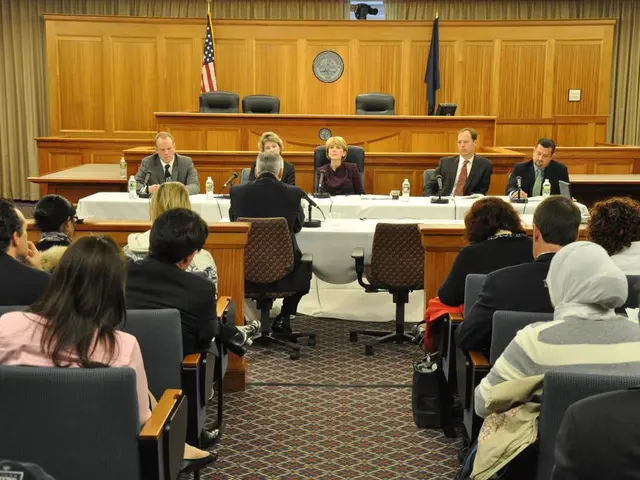NBA Advocates for Tightened Governance over Betting Markets
The NBA's Push for Regulating Sports Prediction Markets
In a bid to maintain game integrity, the NBA has written to the Commodity Futures Trading Commission (CFTC) urging stricter regulations on sports prediction markets. The NBA is wary about the unbridled growth of these markets, fearing their rapid expansion could threaten the honesty of the games.
In a letter to the CFTC's acting chairman, Caroline D. Pham, the NBA voiced their concerns about the proliferation of sports prediction markets that are mushrooming unchecked. These markets are evolving swiftly, thanks to self-certification, and have yet to receive substantial regulatory scrutiny.
The NBA has observed the development of prediction markets expanding beyond season-long bets to focus on individual game outcomes, player performances, and officiating decisions. The League is concerned that unchecked expansion could potentially undermine the integrity of the games.
Unlike traditional sports betting, which follows stringent state regulations, sports prediction markets largely escape this regulatory net. Self-certification allows for these markets to launch without engaging state regulators, thereby shifting the responsibility of integrity to the CFTC.
This regulatory gap creates a challenging environment for effective risk monitoring and addressing emerging issues. Exchanges and brokers are not obliged to report suspicious activities or cooperate with the League during investigations under current regulations. The NBA believes this impedes the process of keeping risks in check as these markets gain popularity.
Recent months have seen an increase in the expansion of prediction market offerings. Companies like Kalshi have led this surge, initially offering season-long futures but promptly progressing to single-game contracts, now dominating exchange volumes.
Traditional sports betting regulations require operators to secure state approval for new bet types. Some operators, such as Sporttrade, are challenging this norm and seeking national approval, rather than the usual state-level licensing.
Federally regulated commodities exchanges, though, have the ability to self-certify contracts and start trading immediately. The CFTC can then decide to request contract removal or take no action at all. This flexible regulatory framework has invited criticism despite claims from companies like Kalshi that they consulted with the CFTC throughout the process.
The NBA's petition to the CFTC has sparked a fierce debate on the regulation of sports prediction markets. As these markets intermediate with traditional sports betting, the industry awaits the CFTC's response and further developments in regulatory approaches.
The NBA's primary aim is to establish a regulatory framework that ensures robust game integrity measures, such as insider trading and match-fixing prevention mechanisms, akin to those in traditional sports betting markets.
Enrichment Data:- The letter from the NBA to the CFTC argues that prediction markets need robust regulation due to the potential risks they pose to game integrity, unlike traditional sports betting which faces stringent regulatory oversight.- The CFTC had initially planned a roundtable discussion about sports prediction markets but canceled it without setting a new date.- The current submissions to the CFTC regarding sports prediction markets include inputs from the NBA, Major League Baseball, and other entities.- The NBA proposes that the CFTC adopt a comprehensive regulatory framework akin to those governing state sports betting markets, which would include meaningful limitations on market expansion, better oversight, monitoring of suspicious activities and a possible dialogue with market platforms to discuss regulatory measures if they continue to operate.
- The NBA's concerns about the unregulated growth of sports prediction markets highlight the need for adequate oversight in the fintech industry, especially considering the risks these markets pose to game integrity.
- The NBA believes that the current regulatory gap creates a challenging environment for effective risk monitoring, as exchanges and brokers are not obliged to report suspicious activities or cooperate with the League during investigations.
- The NBA's push for regulating sports prediction markets aims to establish an industry-standard akin to traditional sports betting markets, incorporating mechanisms for insider trading and match-fixing prevention.
- The sports-analysis sector has been closely watching the debate on the regulation of sports prediction markets, as these markets intermediate with traditional sports betting and could significantly impact the sports finance business.
- Despite companies like Kalshi claiming they consulted with the Commodity Futures Trading Commission (CFTC) throughout the process, the NBA's petition to the CFTC has sparked a fierce debate on the regulatory approaches needed for the sports prediction markets industry.








